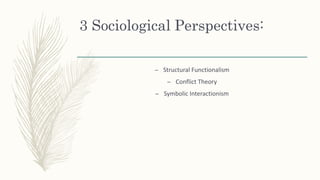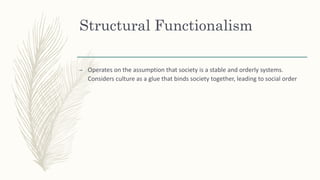Society and culture according to the three disciplines
- 1. Society and Culture According to the Three Disciplines Prepared by: Sir. Cari Edward C. Be├▒alet
- 2. Learning Objectives: ŌĆō Discuss how society and culture is viewed according to the three disciplines.
- 3. Three Disciplines ŌĆō Anthropology ŌĆō Sociology ŌĆō Political Science
- 4. Anthropology ŌĆō Considers culture as the central focus. Studies different cultures of different societies.
- 5. 2 major views: ŌĆō Relativistic Approach ŌĆō Ethnocentric Approach
- 6. Relativistic Approach ŌĆō Considers cultures as equal. Holds that there are no ŌĆ£superiorŌĆØ and ŌĆ£inferiorŌĆØ cultures, and each is unique in its own way. ŌĆō Cultural Relativism ŌĆō recognizes and accepts the cultural differences between societies.
- 7. Ethnocentric Approach ŌĆō OneŌĆÖs native culture is superior to other cultures. Tends to have a negative view of other countries and people. Diminishes or invalidates ŌĆ£otherŌĆØ ways of life and creates a distorted view of oneŌĆÖs own. ŌĆō Xenocentrism ŌĆō considers their culture as inferior to others. e.g. FilipinoŌĆÖs ŌĆ£Colonial MentalityŌĆØ
- 8. Sociology ŌĆō Relates culture with overall context of social order.
- 9. 3 Sociological Perspectives: ŌĆō Structural Functionalism ŌĆō Conflict Theory ŌĆō Symbolic Interactionism
- 10. Structural Functionalism ŌĆō Operates on the assumption that society is a stable and orderly systems. Considers culture as a glue that binds society together, leading to social order
- 11. Conflict Theory ŌĆō Assumes that there is a constant power struggle among the various social groups and institutions within a society. Study the culture of ŌĆ£dominant classesŌĆØ and analyze how this culture is imposed on other classes.
- 12. Symbolic Interactionism ŌĆō Views individual and a group behavior and social interactions as defining features of society. Believes that culture provides shared meanings to the members of society. The more meanings are shared, the more society ensures social order.
- 13. Political Science ŌĆō Examines culture as a vital aspect of society. Culture, together with political socialization is analyzed in order to explain political behavior such as voting patterns and the behavior of leaders. ŌĆō Culture is seen as an important element in building social capital and could also lead to future conflicts and divisions.
- 14. Factors ŌĆō Multiculturalism ŌĆō Cultural Sensitivity
- 15. Multiculturalism ŌĆō An ideology that acknowledges and promotes cultural diversity within society. Entails the establishment of political groups and institutions comprised of people from diverse cultures.
- 16. Cultural Sensitivity ŌĆō Advances awareness and acceptance of cultural differences but encourages a critical stance in dealing with issues regarding diversity.

















